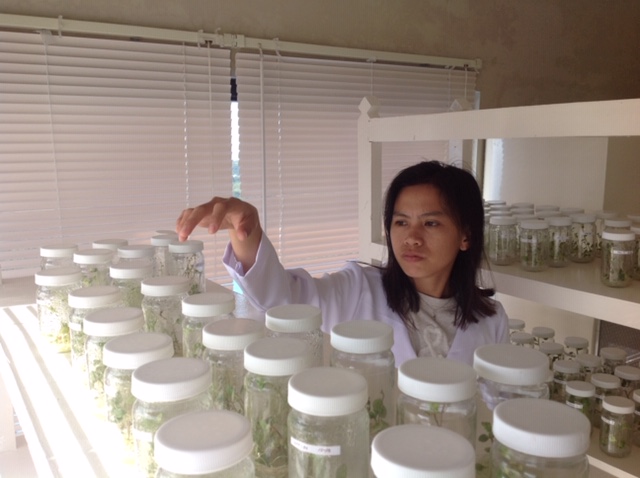
Problem: Degeneration of planting material of clonally propagated potatoes and sweet potatoes results in very low production. The lack of access to virus free planting material is the problem.
Outcomes: Our Filipino partner, the Potato Systems Research & Training Center (PSRTC), has demystified tissue culture in the remote mountain community where it is based with a simple very low cost laboratory that maintains pathogen free stocks of the varieties of potatoes, sweet potatoes and other crops demanded by farmers. These are multiplied using mother plants in greenhouses to produce apical rooted cuttings for purchase by farmers, who have benefited significantly!
Quality planting material of an adapted variety is a crucial factor for optimum crop yield, socio-economic acceptability and marketability. Mount Kanlaon region was a significant potato growing area in the Eastern Visayas, Philippines . Potato production has drastically declined in the last 25-30 years primarily due to lack of quality planting material, bacterial wilt infection of soil and seed tubers, and tuber moth damage during storage. Farmers have been forced to use locally produced potatoes as seed tubers for decades resulting in serious degeneration that has almost wiped out local potato production.

Figure 1
For sweet potatoes, which is a major crop being grown by farmers, the variety “C1” a white skinned and white flesh variety was the most popular variety that has been grown for more than 20 years without the provision of clean planting materials. Farmers are observing a dramatic decrease in yields due to overall degeneration.

Figure 2
PSRTC constructed a low cost simple tissue culture laboratory under ambient temperatures with sunlight for the maintenance and multiplication of clean planting materials of potato and sweet potatoes (Figures 1&2). The tissue culture plants are further grown in simple greenhouses as mother plants from which apical cuttings are harvested weekly and rooted and either sold to farmers or further multiplied to produce minitubers for sale to farmers ( Figures 3&4).
Figure 3
Mt Kanlaon area farmers along with our partner selected their preferred potato and sweet potato varieties. These selected varieties were sent to the Northern Philippines Root Crops Research and Training Center at Benquet State University for virus cleanup and making them pathogen free. One of the local potato clones was cleaned for viruses by Bureau of Plant Industry, Baguio City. PSRTC does the mass multiplication for farmers.

Figure 4
PSRTC has also selected new high “vitamin A” and a purple sweet potato variety that are now being grown commercially by farmers. The program of tissue culture and rapid greenhouse level multiplication is driven by the demands of the 100s of farmers who come to the PSRTC requesting rooted cuttings of specific varieties at specific times during the calendar year for their farming operations. There is renewed optimism amongst the farmers with this very significant improvement in the quality of their planting material that they can further multiply for 2-5 generations on their farms with the proper training and guidance provided by the center.
